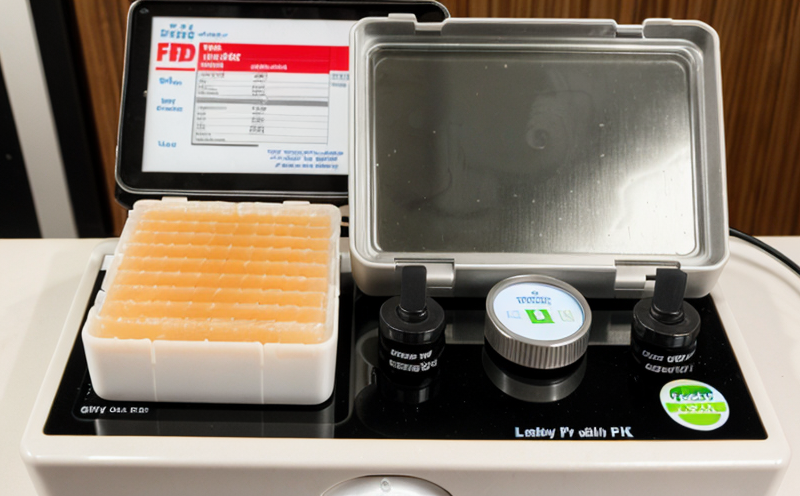ISO 17059 Fatty Acid Profiling in Infant Formula
The ISO 17059 standard is a critical framework that ensures laboratories providing fatty acid and lipid profile testing are capable of delivering accurate, reliable, and repeatable results. This service specifically focuses on the analysis of fatty acids in infant formula, an area where precision is paramount due to its direct impact on nutritional outcomes for infants.
Infant formula manufacturers must adhere to strict regulations regarding the composition and quality of their products. Fatty acid profiling helps ensure that these formulas meet not only legal requirements but also the nutritional needs of infants. The standard focuses on identifying essential fatty acids like linoleic, alpha-linolenic, and docosahexaenoic acids (DHA), which are crucial for brain development, vision, and overall growth.
The testing process involves several steps that ensure accurate results. First, the sample must be properly prepared to avoid any contamination or degradation of fatty acid components. This typically includes dilution of the formula and extraction using solvents like dichloromethane/methanol mixtures followed by derivatization for analysis with gas chromatography mass spectrometry (GC-MS).
The methodology outlined in ISO 17059 provides detailed instructions on sample preparation, calibration, and quantification of fatty acids. It also specifies the acceptable ranges for various fatty acid levels based on current scientific understanding of infant nutrition needs.
Understanding the lipid profile of an infant formula product is essential because it helps determine whether the formulation contains adequate amounts of beneficial fats necessary for proper development during early life stages. By ensuring compliance with ISO 17059 standards, laboratories can provide reliable data that supports regulatory compliance and informs product improvements based on scientific evidence.
Accurate fatty acid profiling is crucial not only from a health perspective but also economically speaking; it influences market positioning as consumers increasingly demand transparency about the contents of their products. Reliable testing results build trust between manufacturers, regulators, healthcare providers, and parents.
Scope and Methodology
The scope of this service covers comprehensive fatty acid profiling in infant formula according to ISO 17059 guidelines. This involves analyzing the total lipid content as well as individual fatty acids present within the product matrix.
- Total Lipid Content: Determined through extraction methods followed by gravimetric or titrimetric analyses.
- Fatty Acid Composition: Analyzed via gas chromatography-mass spectrometry (GC-MS), which provides detailed information about the types and quantities of fatty acids present in each sample.
The methodology adheres strictly to ISO 17059, which includes rigorous quality control measures such as spike recoveries, duplicate analyses, and comparison with certified reference materials whenever possible. These steps ensure that any discrepancies are identified early on, allowing for corrective actions before final results are reported.
Our laboratory uses state-of-the-art equipment including Agilent 7890A GC coupled with an Agilent 5977B MSD to achieve high precision and accuracy in our measurements. The system is regularly calibrated using certified reference standards to maintain consistency across all samples analyzed.
Quality and Reliability Assurance
To ensure the highest level of quality and reliability, we implement several key practices:
- Calibration: All instruments are calibrated using certified reference materials prior to each batch of samples.
- Spike Recoveries: Samples are spiked with known amounts of fatty acids, then re-analyzed to check for recovery rates. Acceptable ranges typically fall between 95% and 105%.
- Duplicate Analyses: Each sample undergoes duplicate analysis to account for variability in the testing process.
- Certified Reference Materials: Whenever feasible, certified reference materials are used to validate our analytical methods against internationally recognized benchmarks.
We also participate in proficiency testing programs organized by recognized bodies such as A2LA (Accreditation Laboratory) and UKAS (United Kingdom Accreditation Service). These external validations further reinforce the robustness of our processes.
Our commitment to quality does not end there; we continuously review and update our procedures based on feedback from clients and advancements in technology. This ensures that we remain at the forefront of analytical capabilities, providing you with up-to-date insights into your product’s fatty acid profile.
International Acceptance and Recognition
The ISO 17059 standard is widely accepted globally due to its stringent requirements for laboratory performance. Compliance with this standard ensures that laboratories meet high standards of accuracy, precision, and reliability in fatty acid profiling.
Infant formula manufacturers around the world rely on labs accredited according to ISO 17059 when conducting research or quality control checks related to fatty acids. This includes major markets like North America, Europe, Asia-Pacific, and beyond. Regulatory bodies such as FDA (Food and Drug Administration), EFSA (European Food Safety Authority) recognize these accreditations positively.
By choosing our ISO 17059-compliant service for infant formula fatty acid profiling, you gain access to a network of trusted partners who adhere to some of the strictest quality assurance protocols available. This enhances your ability to meet international standards and demonstrates commitment to product safety and efficacy.





